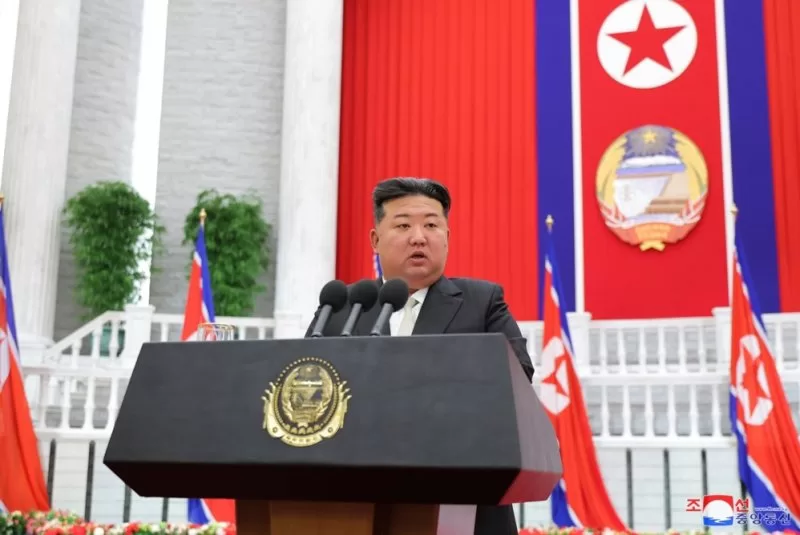North Korea’s recent efforts to cut off connections to South Kore present a shift in Kim Jong Un’s stance on unifying the peninsula. File Photo by KCNA/EPA-EFE
Oct. 15 (UPI) — In recent weeks, major shifts have taken place on the Korean Peninsula in relation to the DPRK’s position towards North and South Korean reunification.
Most recently, North Korea said that it will completely cut off roads and railways connected to South Korea and will fortify its southern border along the DMZ. North Korea had already been installing landmines and barriers along the DMZ earlier this year.
Although already heavily guarded on both sides, the view of the DMZ as a formal southern border of the DPRK is a shift by the North Korean government that comes in the wake of the announcement by Kim Jong Un earlier this year that North Korea would be abandoning the goal of a unified Korea.
Experts and government agencies around the world are left with the task of determining whether North Korea’s abandonment of unification is genuine, or if this is consistent with the greater picture of erratic decision-making and saber-rattling that has become characteristic of its leadership.
Whether or not the shift is genuine, it has produced tangible reactions.
Last week, South Korea agreed to pay 8.3% more to host U.S. military forces in South Korea.
Earlier this year, longtime Korea analysts Robert Carlin and Siegfried S. Hecker published a stern warning that this time could be different and that the DPRK could actually be preparing for war.
If authentic and not for show, this raises the question of why now, and what this could be a reaction to.
The outward position of the DPRK has been that it is the presence of U.S. forces on the Korean peninsula that gives it reason to develop militaristic and antagonistic policies. Some have speculated in the past that increased posturing from the North could be a signal that the DPRK is on the verge of collapse and that Kim Jong Un’s health could be failing.
Such wishful thinking, however, has existed since before Kim Jong Un took power and is in part what led to decades of reactive policy and failed deterrence strategies which some analysts have argued gave the DPRK the space they needed to create their nuclear program.
Another possibility as to why Kim Jong Un is burning bridges is that he is trying to block unification from happening in any way where he is not personally part of the process.
The recent push against unification could potentially be rooted in the fear that a shift toward unification may actually be on the horizon.
South Korean President Yoon Suk Yeol has been advocating for the ideal of a unified Korean Peninsula and stated last week that a unified, nuclear-free Korean Peninsula would contribute to peace and stability in the Indo-Pacific region and unlock new opportunities across a large, interconnected market.
“What’s interesting about the current view of unification as espoused by the South Korean president ….[is that] it is an ideational view of unification that talks about it in terms of values…[and] what unification will do for the freedom of the North Korean people,” former Director for Asian Affairs at the White House National Security Council (NSC) Victor Cha commented in a podcast interview for the Center for Strategic & International Studies (CSIS) last month.
Dr. Hyun Jun Preston Moon, founder and chairman of the Global Peace Foundation, a non-profit, has long promoted such an ideal-based unication of the Korean Peninsula.
In his 2014 book Korean Dream: A Vision For a Unified Korea, Moon writes that “we [Koreans] should bring peace and prosperity to the [Korean] peninsula and then, as a united people, live to bring benefit to the region and subsequently the world. We can achieve this by becoming an enlightened nation that advocates peace with the moral authority of our own unification and our desire to serve the world.”
Moon, the honorary chairman of UPI, considers the meaning of the abandonment of North Korea’s long-established reunification policy to be quite clear.
He has stated that Kim Jon Un fears his people and the influence on them of values-based appeals for reunification.
As a result, Kim “has withdrawn from the contest over which ideology will prevail on the Korean peninsula.”
North Korea’s Supreme People’s Assembly (SPA) amended North Korea’s constitution last week without any public announcements on whether these amendments reflect new policies on rejecting unification and redefining the border, in spite of Kim Jong Un’s demanding the changes earlier this year.
This has led some to believe that there may be internal opposition to Kim’s dismantling of reunification frameworks.
Both Kim Jong Un’s father, Kim Jong Il, and his grandfather, Kim Il Sung, supported the ideal of a unified Korean peninsula.
Kim Jong Un’s dismantling of not only their ideological framework but also physical monuments put in place by his father that were built to serve as a reminder for this eventual goal are a radical shift for North Korea that could potentially create an impetus for the birth of factions within DPRK leadership.
The stakes are high for the world when nuclear powers careen into unprecedented territories. However, while devotion of the DPRK apparatus to Kim Jong Un has until now appeared to be unconditional, this new shift will test those commitments in new and unpredictable ways.
